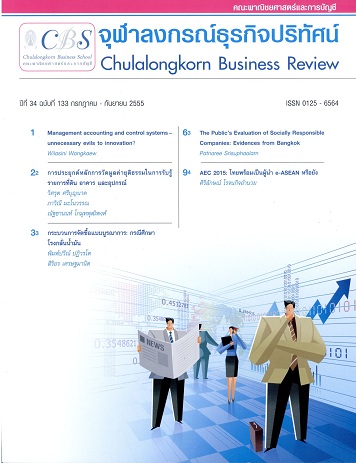The Public’s Evaluation of Socially Responsible Companies: Evidences from Bangkok
Main Article Content
Abstract
บทคัดย่อ
งานวิจัยนี้สำรวจการรับรู้ของสาธารณชนเกี่ยวกับความรับผิดชอบต่อสังคมของบริษัทและการประเมินเพื่อแยกแยะบริษัทที่มีความรับผิดชอบต่อสังคมและบริษัทที่ไม่มีความรับผิดชอบต่อสังคม ผลการสำรวจโดยการสัมภาษณ์เชิงคุณภาพจากประชาชนจำนวน 471 คน ที่อาศัยและทำงานอยู่ในเขตพื้นที่กรุงเทพมหานคร พบว่าประชาชนให้คำนิยามความรับผิดชอบครอบคลุมถึง “ความสามารถในการทำตามหน้าที่” และ “การเผื่อแผ่ช่วยเหลือ” ดังนั้น บริษัทที่จะได้รับการยอมรับว่าเป็นบริษัทที่มีความรับผิดชอบต่อสังคมต้องสามารถทำตามหน้าที่ได้เป็นอย่างดีและต้องแสดงความรับผิดชอบหากเกิดเหตุการณ์ที่ส่งผลในทางลบต่อสังคมและสิ่งแวดล้อมเนื่องจากการกระทำของบริษัทนั้น ๆ นอกจากนี้ บริษัทขนาดใหญ่ที่มีความมั่นคงถูกคาดหวังจากสังคมให้ดำเนินกิจกรรมเพื่อสังคม อย่างไรก็ดีกิจกรรมเพื่อสังคมที่ได้รับการยอมรับต้องส่งผลที่เป็นรูปธรรมและได้ทำมาอย่างต่อเนื่องยาวนาน การตอบแทนสังคมโดยการบริจาคอาจจะเป็นเงื่อนไขสำคัญแต่ไม่ใช่เงื่อนไขที่จำเป็นสำหรับบริษัทที่ได้รับการยอมรับจากสังคมว่าเป็นผู้มีความรับผิดชอบต่อสังคม การวิเคราะห์ผลการสำรวจแสดงให้เห็นถึงระดับความรับผิดชอบต่อสังคมตั้งแต่รับผิดชอบมากไปจนถึงไร้ความรับผิดชอบทำให้คำนิยามของคำว่า “ความรับผิดชอบต่อสังคมของบริษัท” มีชัดเจนในเชิงปฏิบัติการ มีผลต่อการวางแผนและการทำงบประมาณของกิจกรรมความรับผิดชอบต่อสังคมเชิงกลยุทธ์ ซึ่งสามารถนำไปประยุกต์ใช้สำหรับบริษัทขนาดกลางและเล็กที่ต้องการมีส่วนร่วมในการเป็นบริษัทที่มีความรับผิดชอบต่อสังคมได้ดี งานวิจัยชิ้นนี้ยังได้ใช้โปรแกรมคอมพิวเตอร์ที่สร้างขึ้นมาเพื่อช่วยประมวลผลข้อมูลเชิงคุณภาพในภาษาไทยอีกด้วย
คำสำคัญ : ความรับผิดชอบต่อสังคมของบริษัท ความไม่รับผิดชอบต่อสังคมของบริษัท การรับรู้ของผู้มีส่วนได้ส่วนเสีย การตรวจสอบจากสังคม ผลการดำเนินงานด้านสังคมของบริษัท
Abstract
This paper investigates the public’s perception of socially responsible corporations and how it evaluates socially responsible and socially irresponsible companies. A qualitative interview survey of four hundred seventy-one subjects was conducted in Bangkok area. The findings show that the public considers the term responsibility to include two more terms, accountability and contribution. A firm must be accountable for its everyday operations and take corrective action when operations go wrong. The large, highly-stable, and financially sound company should contribute consistently to society to render a concrete outcome and be labeled as socially responsible. A contribution to society may be necessary but not sufficient condition in the eyes of the public. A description of a socially responsible company is more convincing when public opinion is taken into account. A corporate socially responsible (CSR) continuum could be constructed to describe actions from socially irresponsible to socially responsible, including a list of the minimum requirements necessary to refrain from being labeled socially irresponsible. A practical definition of CSR contributes to strategic CSR planning and budgeting that small- and medium-sized businesses could apply. In addition, this study uses a computer program to code large-scale qualitative data collected in a non-English language.
Keywords: Corporate social responsibility, Corporate social irresponsibility, Stakeholders' perception, Social audit, Corporate social performance.
Article Details
Opinions and discussions in papers published by the Creative Business and Sustainability Journal (CBSJ) are deemed as personal opinions and the responsibility of the writers. They are not the opinions or responsibility of the Chulalongkorn Business School of Chulalongkorn University.
Papers, content, information etc. appearing in the Journal are deemed to be the copyright property of the Chulalongkorn Business School of Chulalongkorn University. Anybody or any organization that wishes to publish any part of them or use them in any way must obtain written permission from the Chulalongkorn Business School, Chulalongkorn University.


